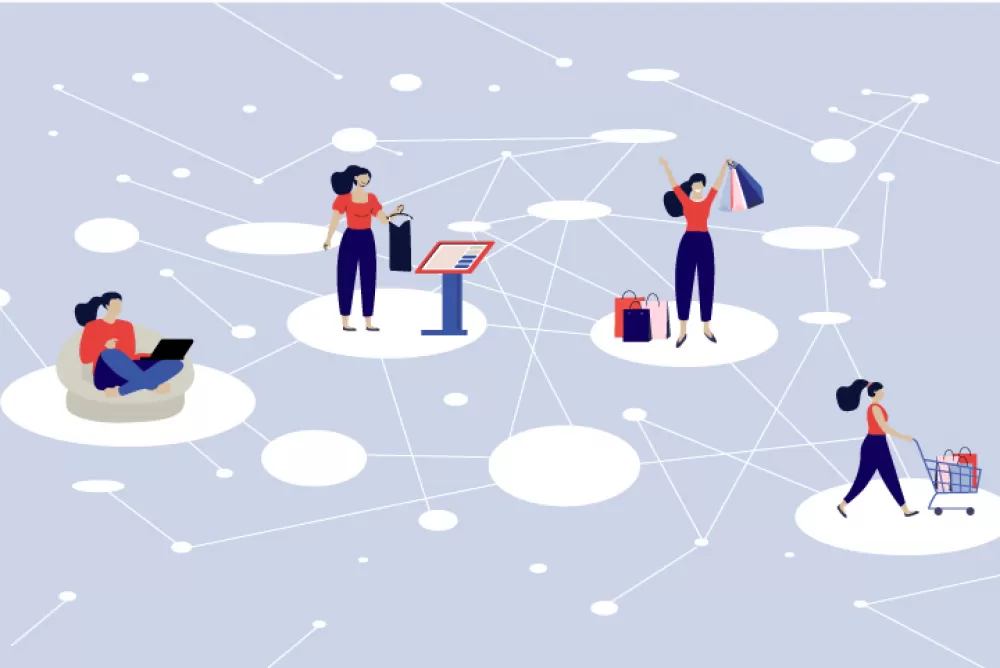
The idea that high productivity is working in a manner that maximizes every waking hour of a day, completing tasks as quickly as possible, is fundamentally flawed. Even after dealing with different degrees of a global pandemic for the last three years, we are not accustomed to recognizing a productive person as someone who has made a life choice to deliver remotely, in between personal demands. We tend to feel that physical presence somehow translates to competence. The success of the hybrid work model, which is here to stay without doubt, depends on how quickly we untether ourselves from these prejudices.
“My role involves working cross-functionally and collaborating with global offices. This means my working hours need to adapt to different time zones. The flexibility that hybrid work offers has empowered me to maximize efficiency and responsiveness. I don’t lose time on commute; I can schedule a workout instead or catch up on sleep and be available for late-night meetings. Hybrid culture allows me to exercise a high level of autonomy because it puts the focus on what is being delivered versus how it is being delivered.”
Abhishek Patil
Assistant Manager, Brand and Creative
At the moment, 40 percent of our team works remotely, and the rest of us follow a hybrid schedule, which involves going to the office twice a week. One might argue that, as a tech company, we are more accustomed to a high level of digital adoption. But in the last few years, we too, have had to adopt technology more than ever before. The success of a hybrid model will always be highly dependent on how sophisticatedly we can interact through digital platforms, but in the absence of proper policies and practices, technology alone won’t suffice.
“My role is extremely collaborative and is perhaps easier to execute in person, but at the moment, my mother’s health needs my attention. Working remotely allows me to be more present for her and fulfill my responsibilities. To compensate for the lack of face time, I make it a point to call people outside of scheduled meetings, perhaps via a video call, and participate in community calls. I feel that nothing can replace in-person meetings, but these interactions reduce the fatigue from constant digital communication.”
Apoorva Choudhary,
Brand Manager
Hybrid work puts the spotlight on agility

Agile organizations focus on outcomes versus outputs. Agile teams are self-motivated, self-governed, and self-regulated. In this environment, people focus on the right goals; they feel empowered, trusted, and supported. Hence, they perform efficiently. It has little to do with proximity and location. It’s not as though I have never had apprehensions about the efficiency issue, but over time, I have learned to turn over control and trust that once team members understand the task at hand and how it is connected to organizational goals, they will perform without micro-management.
“My role involves thinking, ideating, researching, and writing, which works best when I am left undisturbed. To be honest, I have always found an office environment loud, chaotic, and distracting. I remember I would always work with my headphones on to tune out the noise, so I prefer to work from home. Also, if I am slightly unwell, I can take an hour off to rest versus taking an entire day off, so I am more productive in a sense.”
Priyanka Ghosh,
Lead – Thought Leadership and Branded Content
Companies must think systematically about what works best and refine hybrid policies

According to insight published by McKinsey, although top executives confirmed that their organizations were definitely adopting hybrid work for roles that aren’t essential to perform on-site, two-third of the companies lacked a detailed plan for handling hybrid work, and this is going to be the main challenge going forward. Remote work has enabled us to expand and dig deeper into geographies to access talent that was earlier out of our reach. But attracting talent is only the beginning. Retaining talent requires an ongoing effort, and hybrid working presents equal parts opportunities and challenges.
How we ensure remote employees don’t feel isolated or how we handhold people and rebuild connections in-person will define success in the hybrid paradigm. As a team, we follow a systematic communication calendar, which maintains a regular connect.
“I work both as a team manager and an independent contributor. As a manager, I prefer in-person meetings because it translates to better connection and engagement as a team. It’s simpler to check project statuses and divert resources where required when everyone is under the same roof. You cannot match that level of synchronicity remotely. However, as an independent designer, I prefer to stay at home because it’s easier to focus on tasks, and I can completely do away with wasting five hours of commute.”
Pradeep Kumar,
Creative Director
A commitment to hybrid is a commitment to build a more human-centered organization. We cannot overlook trends that the 2022 LinkedIn’s Glint Wellbeing report pointed toward, stating that employees at remote-friendly organizations were 32 percent more likely to struggle with work-life balance compared to their peers at other organizations. The fatigue of remote work five days a week is very real; we have all experienced that, so we must reshape the way we work foundationally so that we are participants in the well-being of our teams. For instance, can organizations that don’t have full occupancy in their headquarters convert some of the real estate for people who work remotely to travel and stay on premises seamlessly and collaborate in person as they need? Or can necessary allowances be built into compensation structures so that integrating hybrid becomes more synergistic? There isn’t a clear answer at the moment, and there isn’t going to be a single solution either because the demands of every business and every function within those businesses are not interchangeable. So, the model is going to be unique and ever-evolving. But one thing is for certain – companies that are more focused on delivering the right employee experience will have a competitive advantage; those that fail will lose out on talent.













